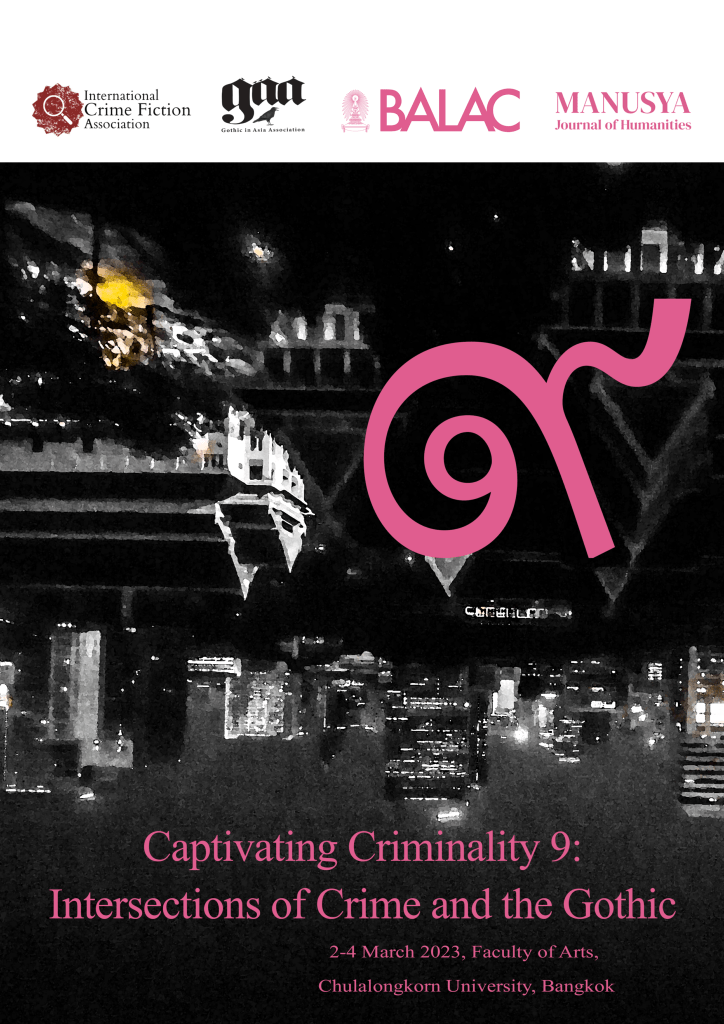
Below you can find a list of events, keynotes, guest lectures, online talks, workshops, and seminars that I have participated in or delivered in recent years, along with international conferences I have organised.
Here be Monsters: What can Asia teach us about Gothic?
Plenary Lecture. Progression, Regression, and Transgression in Gothic World Literature & Film: New Approaches to the Ethics of Difference. Gothic Without Borders online conference, 29/09-2/10/2023.
 Gothic narratives have often depicted Asia as the land of monsters, yet Asian monsters themselves have rarely received the attention they deserve. With countless books theorizing vampires, werewolves and zombies, Asian monsters continue to be seen as an oddity, evading definitions and complicating our understanding of monstrosity. Evoking fear, familiarity, and reverence in equal measure, Asian monsters can be simultaneously Gothic and anti-Gothic. Like all monsters, they do cultural work, and in this lecture, I will discuss three specific cases that can help me address a larger relationship between Asian Gothic and Gothic Studies in general.
Gothic narratives have often depicted Asia as the land of monsters, yet Asian monsters themselves have rarely received the attention they deserve. With countless books theorizing vampires, werewolves and zombies, Asian monsters continue to be seen as an oddity, evading definitions and complicating our understanding of monstrosity. Evoking fear, familiarity, and reverence in equal measure, Asian monsters can be simultaneously Gothic and anti-Gothic. Like all monsters, they do cultural work, and in this lecture, I will discuss three specific cases that can help me address a larger relationship between Asian Gothic and Gothic Studies in general.
Surf’s Up: The Korean Wave and Thai Cinema
Keynote Address. The Korean Wave in Southeast Asia: Consumption and Production. Kuala Lumpur, MALAYSIA, 10 January 2013.
 The effects of the “Korean Wave” on contemporary Thai cinema are easily felt but seldom officially acknowledged. While attempts have been made to account for the popularity of Korean music and drama with Thai audiences, little has been done to research the potential influence the Korean wave phenomenon had on local media production, and on the Thai film industry in particular. With that in mind, this lecture intends to go beyond the obvious debates on “borrowed” iconography and plot elements, and examine, instead, potential Korean inspirations and influences on contemporary Thai cinema in terms of genre development, narrative structure and co-production. We will discuss the emergence of the strong “masculinised” heroine in Thai comedies, re-configuration of the horror, comedy and action thriller genres, changes in the narrative strategies of 21st century Thai films, and the results of creative co-production between Thailand and Korea.
The effects of the “Korean Wave” on contemporary Thai cinema are easily felt but seldom officially acknowledged. While attempts have been made to account for the popularity of Korean music and drama with Thai audiences, little has been done to research the potential influence the Korean wave phenomenon had on local media production, and on the Thai film industry in particular. With that in mind, this lecture intends to go beyond the obvious debates on “borrowed” iconography and plot elements, and examine, instead, potential Korean inspirations and influences on contemporary Thai cinema in terms of genre development, narrative structure and co-production. We will discuss the emergence of the strong “masculinised” heroine in Thai comedies, re-configuration of the horror, comedy and action thriller genres, changes in the narrative strategies of 21st century Thai films, and the results of creative co-production between Thailand and Korea.
Looking East: From Folk Horror to Horror of the Folk in Thai Cinema
Digital Lecture. Folk Horror series organised by The Last Tuesday Society and the Victor Wynd Museum of Curiosities, 14/12/2023.
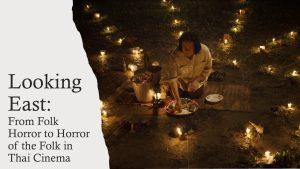 Folk horror is often said to be about the fear of regression, the fear of going back to ‘the old ways’ and the anxiety that ‘the old ways’ may be right. But what if the old ways and the new ways were very much the same? How does folk horror adapt to animist cultures, where old-age rituals and modern beliefs go hand in hand? Where does it find its ‘monstrous tribe’? Thai horror films reflect the animist orientation of Thai culture but do not situate animism in opposition to official religion and modernity, since animistic beliefs and practices are commonplace in today’s Thailand. Prevalent across the country and practised across all social strata, Thai animism and related with it folklore cannot be used as a designator of difference in the Thai context. If Thai folk horror produces its monstrous tribe, their monstrosity is not the result of regression, evidenced in arcane rituals, but rather a commentary on the existing inequality within Thai society. Thai folk horror is thus primarily invested in representing the rural-urban divide and its profound implication in tensions related to ethnicity and class.
Folk horror is often said to be about the fear of regression, the fear of going back to ‘the old ways’ and the anxiety that ‘the old ways’ may be right. But what if the old ways and the new ways were very much the same? How does folk horror adapt to animist cultures, where old-age rituals and modern beliefs go hand in hand? Where does it find its ‘monstrous tribe’? Thai horror films reflect the animist orientation of Thai culture but do not situate animism in opposition to official religion and modernity, since animistic beliefs and practices are commonplace in today’s Thailand. Prevalent across the country and practised across all social strata, Thai animism and related with it folklore cannot be used as a designator of difference in the Thai context. If Thai folk horror produces its monstrous tribe, their monstrosity is not the result of regression, evidenced in arcane rituals, but rather a commentary on the existing inequality within Thai society. Thai folk horror is thus primarily invested in representing the rural-urban divide and its profound implication in tensions related to ethnicity and class.
Thai Horror Film as an Extension of Thai Supernaturalism
Online Lecture. The Miskatonic Institue of Horror Studies, USA, 22 February 2022.
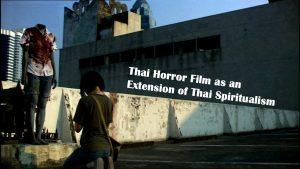 Thai horror films exist as an extension of Thai supernaturalism, a collection of shared beliefs and cultural practices that not only affects the portrayal of the preternatural in the films but also frames the functioning of the local entertainment industry. How then does one make a ghost film for an audience that sees living with spirits as part of everyday experience? How does one create a work of fiction that, on some level, can still be recognized as ‘real’? In order to succeed locally, Thai horror films need to offer a fictional retelling of hypothetically possible spiritual encounters and generate fear by tapping into the personal experience of their viewers. If the filmmakers stray too far from the audience’s expectations, they risk getting seriously criticised for producing an ‘unconvincing’ film narrative. This is the layer of the film that is frequently lost on international viewers, which is why since the early 2000s, we have seen the rise of ‘new’ Thai horror films that align themselves with the pan-Asian Horror aesthetics popularised by Japanese and Korean horror cinema in an attempt to appeal to a wider audience. These new films repackage traditional Thai horror formulas for global consumption using supernaturalism as a means to connect with local viewers and simultaneously exoticize Thai culture for the outsiders. In this lecture we will focus mostly on the 21st century films seen as a distinct stage in the evolution of Thai horror cinema. We will discuss the main themes of these films, situate them in the larger body of Thai cinematic horror, and address the effects of globalisation on horror film production in Thailand.
Thai horror films exist as an extension of Thai supernaturalism, a collection of shared beliefs and cultural practices that not only affects the portrayal of the preternatural in the films but also frames the functioning of the local entertainment industry. How then does one make a ghost film for an audience that sees living with spirits as part of everyday experience? How does one create a work of fiction that, on some level, can still be recognized as ‘real’? In order to succeed locally, Thai horror films need to offer a fictional retelling of hypothetically possible spiritual encounters and generate fear by tapping into the personal experience of their viewers. If the filmmakers stray too far from the audience’s expectations, they risk getting seriously criticised for producing an ‘unconvincing’ film narrative. This is the layer of the film that is frequently lost on international viewers, which is why since the early 2000s, we have seen the rise of ‘new’ Thai horror films that align themselves with the pan-Asian Horror aesthetics popularised by Japanese and Korean horror cinema in an attempt to appeal to a wider audience. These new films repackage traditional Thai horror formulas for global consumption using supernaturalism as a means to connect with local viewers and simultaneously exoticize Thai culture for the outsiders. In this lecture we will focus mostly on the 21st century films seen as a distinct stage in the evolution of Thai horror cinema. We will discuss the main themes of these films, situate them in the larger body of Thai cinematic horror, and address the effects of globalisation on horror film production in Thailand.
It Came from the Well: Japanese Millennial Horror and its Legacy in Asian Cinemas
Online Guest Lecture. Vilnius University, LITHUANIA, 14 November 2023.
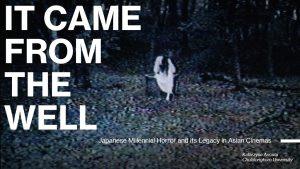 This lecture will provide a brief historical overview of Japanese horror, focusing in particular on its “Millennial” phase—films released between the late 1990s and the early 2000s that were the driving force behind the formation of the “Asian Horror” label promoted as a global marketing and distribution category. We will discuss the main narrative strategies and visual codes of the core Millennial films like Ringu (Nakata, 1998), Audition (Miike, 1999), Battle Royale (Fukasaku, 2000), Kairo (Kurosawa, 2001), and Ju-on (Shimizu, 2002), situate them in the larger context of Japanese horror cinema, and discuss their legacy both in the more contemporary 21 st century J-horror and in other Asian horror cinemas (with examples from South Korea, Hong Kong, Taiwan, Thailand, Indonesia, and the Philippines).
This lecture will provide a brief historical overview of Japanese horror, focusing in particular on its “Millennial” phase—films released between the late 1990s and the early 2000s that were the driving force behind the formation of the “Asian Horror” label promoted as a global marketing and distribution category. We will discuss the main narrative strategies and visual codes of the core Millennial films like Ringu (Nakata, 1998), Audition (Miike, 1999), Battle Royale (Fukasaku, 2000), Kairo (Kurosawa, 2001), and Ju-on (Shimizu, 2002), situate them in the larger context of Japanese horror cinema, and discuss their legacy both in the more contemporary 21 st century J-horror and in other Asian horror cinemas (with examples from South Korea, Hong Kong, Taiwan, Thailand, Indonesia, and the Philippines).
Gothic Film and Television
Online Guest Lecture. Università degli Studi “Gabriele d’Annunzio,” Pescara, ITALY, 7 June 2023.
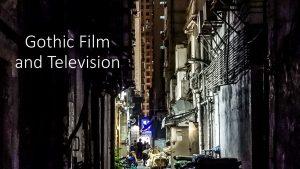 Unlike horror, Gothic is rarely considered a coherent genre within cinema or television. In cinema, Gothic is typically thought to be synonymous with horror, given that early horror films were often adaptations of classic Gothic novels. Rather than acknowledge it as a category in its own right, film scholars tend to think of Gothic in terms of a visual convention, a mood, or aesthetic invoked to describe plots, images, characters or styles within a multiplicity of genres. Similarly, Gothic may be a term rarely used by industry professionals for the purpose of television programming, but its long-standing connection with the medium has been an object of critical scrutiny. Drawing on the available academic studies by prominent Gothic film and television scholars such as Misha Kavka, Xavier Aldana Reyes, Helen Wheatley or Stacey Abbott, this lecture will use examples from Asian cinema (Hong Kong Category III films) and television (Korean drama). We will locate the Gothic in cinema and television within the content and structure of the narrative, as well as the audio-visual form (mise-en-scène, cinematography, editing and sound) and style characteristic of these media.
Unlike horror, Gothic is rarely considered a coherent genre within cinema or television. In cinema, Gothic is typically thought to be synonymous with horror, given that early horror films were often adaptations of classic Gothic novels. Rather than acknowledge it as a category in its own right, film scholars tend to think of Gothic in terms of a visual convention, a mood, or aesthetic invoked to describe plots, images, characters or styles within a multiplicity of genres. Similarly, Gothic may be a term rarely used by industry professionals for the purpose of television programming, but its long-standing connection with the medium has been an object of critical scrutiny. Drawing on the available academic studies by prominent Gothic film and television scholars such as Misha Kavka, Xavier Aldana Reyes, Helen Wheatley or Stacey Abbott, this lecture will use examples from Asian cinema (Hong Kong Category III films) and television (Korean drama). We will locate the Gothic in cinema and television within the content and structure of the narrative, as well as the audio-visual form (mise-en-scène, cinematography, editing and sound) and style characteristic of these media.
Possession and Exorcism in Thai Cinema
Online Talk. Jinn Possession and Exorcism on Screen. The Madani Film Festival and Binus University, INDONESIA, 10 October 2023.
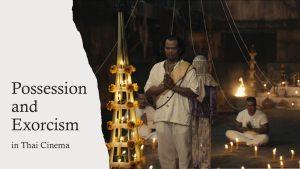 Possession or trance is something that is close to Muslim life globally. Usually, apart from shamanic practices, there are ruqyah (Islamic-based exorcism) rituals to overcome this. Production of films related to possession and ruqyah is also increasing in Indonesia. The film include, but not limited to Ghibah (2021) and Qodrat (2022). In the global world, films such as Munafik (Malaysia, 2016, 2018) and the Dabbe series (Turkey 2006, 2013, 2015) have emerged. In other religions, the phenomenon of possession and expulsion is also widespread. Christian and Catholic traditions, for example, are among those that have produced the most films with this theme, since The Exorcist (1973), The Exorcism of Emily Rose (2005), Deliver Us From Evil (2014), to The Pope’s Exorcist (2023). In Asia, especially Southeast Asia, of course the matter of possession and exorcism has become part of folklore or urban legend, and is not only exclusive to Islam, but also other religions and beliefs. Some of them are The Wailing (2016) and The Medium (2021).
Possession or trance is something that is close to Muslim life globally. Usually, apart from shamanic practices, there are ruqyah (Islamic-based exorcism) rituals to overcome this. Production of films related to possession and ruqyah is also increasing in Indonesia. The film include, but not limited to Ghibah (2021) and Qodrat (2022). In the global world, films such as Munafik (Malaysia, 2016, 2018) and the Dabbe series (Turkey 2006, 2013, 2015) have emerged. In other religions, the phenomenon of possession and expulsion is also widespread. Christian and Catholic traditions, for example, are among those that have produced the most films with this theme, since The Exorcist (1973), The Exorcism of Emily Rose (2005), Deliver Us From Evil (2014), to The Pope’s Exorcist (2023). In Asia, especially Southeast Asia, of course the matter of possession and exorcism has become part of folklore or urban legend, and is not only exclusive to Islam, but also other religions and beliefs. Some of them are The Wailing (2016) and The Medium (2021).
The Binus University Film Study Program Academic Series in collaboration with the 2023 Madani International Film Festival will discuss this phenomenon virtually. How and why do films related to possession and exorcism exist, and what is unique about these Asian, Muslim-majority-based films compared to those from other countries. Jon Towlson (York and Leeds University) will examine the phenomenon of Turkish and Iranian cinema and how religious these films are, while Katarzyna Ancuta (Chulalongkorn University) will examine it from the perspective of Buddhism and Thailand. This discussion will be moderated by Ekky Imanjaya from Binus University.
Strange Tales, Supernatural Romance and Vengeful Ghosts: The Origins of Asian Gothic
Online Guest Lecture. The University of Łódź, POLAND, 7 December 2021.
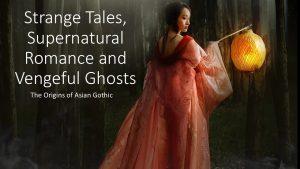 The supernatural roots of Gothic make the ghost story a likely Gothic text, but is this always the case? This talk traces the development of the Chinese-style ghost story in Asian literatures and visual media. It discusses the structural characteristics and common themes of stories of the strange, and argues that their modern reincarnations can be divided into reproductions (where contemporary stories are written in the style closely resembling older texts), utilizations (where contemporary authors make use of their audience’s knowledge of the old texts), and hybridizations (where contemporary stories alter older texts introducing elements of local folklore, modern settings, or other literary influences). We will pay closer attention to the two most common motifs of such stories – that of a supernatural romance, or a love-sick ghost, and of a vengeful spirit as a figure of cosmic/karmic retribution – and discuss their transition from literature to visual media. Finally, we will address the possibility and potential consequences of revaluating these texts as (Asian) Gothic.
The supernatural roots of Gothic make the ghost story a likely Gothic text, but is this always the case? This talk traces the development of the Chinese-style ghost story in Asian literatures and visual media. It discusses the structural characteristics and common themes of stories of the strange, and argues that their modern reincarnations can be divided into reproductions (where contemporary stories are written in the style closely resembling older texts), utilizations (where contemporary authors make use of their audience’s knowledge of the old texts), and hybridizations (where contemporary stories alter older texts introducing elements of local folklore, modern settings, or other literary influences). We will pay closer attention to the two most common motifs of such stories – that of a supernatural romance, or a love-sick ghost, and of a vengeful spirit as a figure of cosmic/karmic retribution – and discuss their transition from literature to visual media. Finally, we will address the possibility and potential consequences of revaluating these texts as (Asian) Gothic.
Asian Gothic
Online Seminar. The Gothic research group at the Department of Iberian and Latin American Studies, Stanford University, USA, 12 May 2021.
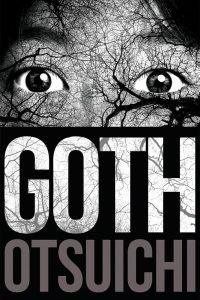
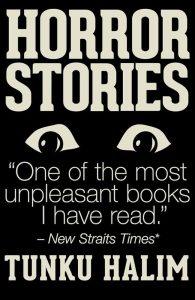 A discussion of selected Gothic literary texts written by Asian writers, with particular focus on the works of Otsuichi and Tunku Halim
A discussion of selected Gothic literary texts written by Asian writers, with particular focus on the works of Otsuichi and Tunku Halim
Keynotes and Guest Lectures Given
- Looking East: From Folk Horror to Horror of the Folk in Thai Cinema, digital lecture delivered as part of the Folk Horror series organised by The Last Tuesday Society and the Victor Wynd Museum of Curiosities, UK, 14 December 2023.
- It Came from the Well: Japanese Millennial Horror and its Legacy in Asian Cinemas, online guest lecture for the faculty and students at Vilnius University, LITHUANIA, 14 November 2023.
- Possession and Exorcism in Thai Cinema, online talk delivered as part of the Jinn Possession and Exorcism on Screen, digital event organised in cooperation with the Madani Film Festival and Binus University, INDONESIA, 10 October 2023.
- Here be Monsters: What can Asia teach us about Gothic?, plenary lecture delivered at the 2nd Gothic Without Borders online conference, Progression, Regression, and Transgression in Gothic World Literature & Film: New Approaches to the Ethics of Difference, CANADA, 29 September – 2 October 2023.
- Gothic Film and Television, online guest lecture for the faculty and students at Università degli Studi “Gabriele d’Annunzio” in Pescara, ITALY, 7 June 2023.
- Thai Horror Film as an Extension of Thai Supernaturalism, online lecture for the Miskatonic Institue of Horror Studies, USA, 22 February 2022.
- Strange Tales, Supernatural Romance and Vengeful Ghosts: The Origins of Asian Gothic, online guest lecture for the faculty and students at the University of Łódź, POLAND, 7 December 2021.
- Asian Gothic, online seminar for the Gothic research group at the Department of Iberian and Latin American Studies, Stanford University, USA, 12 May 2021.
- Surf’s Up: The Korean Wave and Thai Cinema, keynote address delivered at The Korean Wave in Southeast Asia: Consumption and Production symposium, Kuala Lumpur, MALAYSIA, 10 January 2013.
International Conferences Organised
- 9th Captivating Criminality Conference – Crime and the Gothic. Hybrid – Bangkok, THAILAND, 2-4 March 2023.
- International Conference on Gothic Studies – Gothic in a Time of Contagion, Populism and Social Injustice. Online, 10-13 March 2021.
- 4th Annual International ACSA Conference – Visual Imagination: Across Boundaries. Bangkok, THAILAND, 1-3 November 2010.
- 3rd International ACSA Conference – Permanence and Change: The Roles of Culture and Language. Bangkok, THAILAND, 13-14 August 2009.
- 2nd Annual International ACSA Conference – Asian Ways: Traditions and Transitions. Bangkok, THAILAND, 5-6 August 2008.
- 1st Annual International ACSA Conference – New Old Ways: The Changing Faces of Asia. Bangkok, THAILAND, 30 March – 1 April 2007.
- International Conference on Literary and Cultural Studies: Spoiling Cannibals’ Fun? Ustroń, POLAND, September 2002.
- International Conference on Literary and Cultural Studies: Viands, Wines and Spirits. Ustroń, POLAND, September, 2001.
